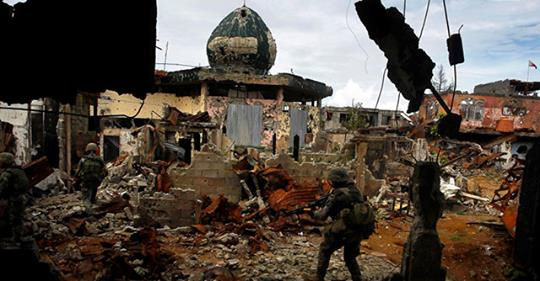FACT SHEET: U.S. Government Assistance Following the Marawi Siege
- TBN News

- Oct 17, 2018
- 3 min read

USAID Assistance
USAID’s Marawi Response Project brings the total USAID funding commitment to the Marawi response to nearly Php3.2 billion ($59.1 million).
The Marawi Response Project is a Php1.35 billion ($25 million), three-year program designed to improve economic and social conditions of communities directly affected by the Marawi Siege.
During and after the siege, USAID provided humanitarian and early recovery assistance to Marawi returnees, as well as displaced and host communities, totaling Php1.84 billion ($34.1 million). Among these projects are:
Php338 million ($6.5 million), to bolster ongoing water, sanitation, and hygiene activities, and launch early recovery livelihoods and transitional shelter interventions in Lanao del Sur Province, reaching almost 83,000 internally displaced people.
Php100 million ($2 million) toboost food security in Marawi and surrounding areas by partnering with the World Food Programme to deliver 1.8 million kilograms of rice — enough to feed 45,000 people for four months — to families displaced by the conflict.
Php480 million ($9.6 million) to work with vulnerable populations, including youth, to enhance their job skills and attain livelihoods. USAID is also bolstering ongoing work to encourage positive community engagement and participation in local governance.
6 million ($8.3 million) to support conflict-affected communities in Marawi City and the surrounding areas in their early recovery and rehabilitation, including restoring access to markets, livelihoods, and services such as water, electricity, health, and education. This includes providing essential maternal, newborn, and child health training and supplies for affected populations.
5 million ($2.55 million) to work with diverse groups of women to promote community dialogue and encourage civic engagement, as well as counter gender-based violence and trafficking in persons, and help displaced girls return to school.
In collaboration with the Philippine government and development organizations, USAID delivered Php156 million ($3 million) in life-saving humanitarian assistance that improved conditions in evacuation centers and host communities. For example, expanded access to water and sanitation facilities, promotion of improved hygiene practices, and distribution of emergency shelter materials benefitted over 7,500 families. In addition, USAID established women- and child-friendly spaces to protect them from exploitation and violence andsupport their psychosocial needs.
USAID, in partnership with the Department of Health and local government units, conducted mass TB screenings for more than 1,000 adult internally displaced persons and 400 children in evacuation centers in Marawi City and surrounding areas. Seventy-five new cases were discovered and promptly started on treatment, helping to prevent the spread of disease.
USAID’s early assistance involved restoring access to clean water by distributing 12,000 water containers and nearly 100,000 chlorine tablets to 12,000 families. USAID also helped displaced students to return to school by distributing 6,500 desks for schools where they are enrolled.
Madrasa Education
The Empowering Madrasa Educator program (Php12.7 million, or$235,000) provides intensive long-term training to 175 madrasa educators and 25 madrasa administrators from Marawi, Lanao del Sur, Cotabato City, Maguindanao, Isabela City, and Basilan. Through the program, madrasa educators will improve their English proficiency and computer literacy, and learn student-centered teaching methods emphasizing critical thinking and creativity.
The Empowering Madrasa Educator program is part of a Php70 million ($1.3 million) roster of education, economic development, youth empowerment, and countering violent extremism outreach programs in response to the Marawi crisis. These programs offer communities opportunities to build leadership skills, enhance educational and economic opportunities, and work collaboratively to address problems they identify in their own communities.
Military Assistance
At the request of the Government of the Philippines, U.S. special operations forces continue to assist the AFP in Marawi in its fight against militants, including support that increases intelligence, surveillance, and reconnaissance capabilities. S. forces have been providing support and assistance in the Philippines for many years, at the request of several different Filipino administrations.
SOURCE: Iloilo Metropolitan Times
Special thanks to:






Comments